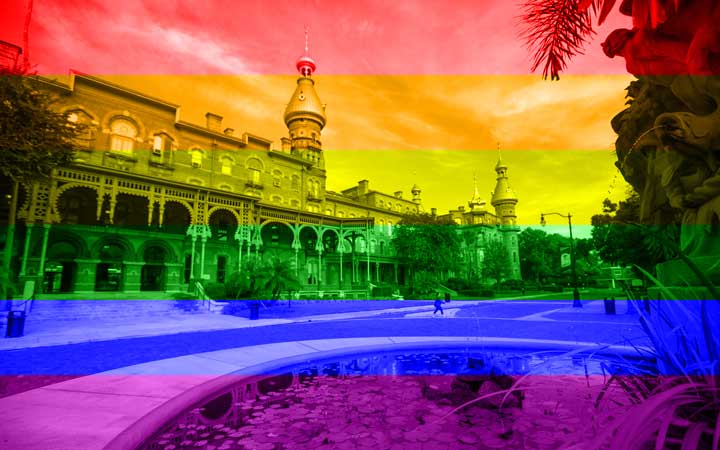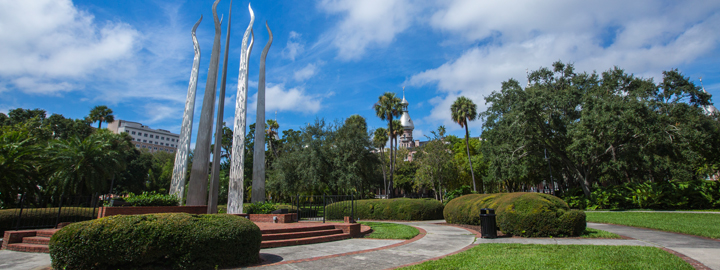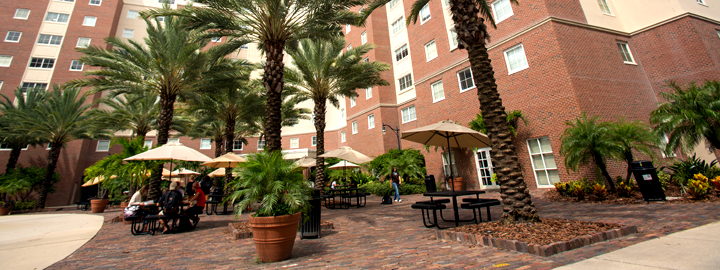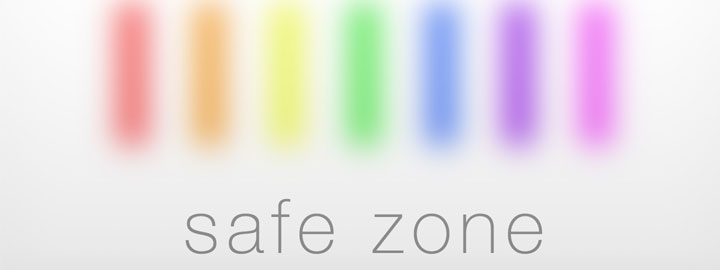Contact Information
Counseling Center
(813) 253-6250
healthcenter@ut.edu
Director of Training and Comunity Support
Coming Soon
LGBTQ+ Programs and Services Coordinator
Andrew Garber
(813) 257-4017
akgarber@ut.edu

Welcome LGBTQIA+ (Lesbian, Gay, Bi, Transgender, Queer, Questioning, Intersex, Asexual +) members and allies! The University of Tampa takes pride in our students, staff, faculty and alumni; we want everyone, of all genders and sexualities, to feel safe, respected, included, valued, supported, encouraged and celebrated. This page provides resources for those in our Spartan community who are LGBTQIA+ members and allies, and those who want to learn more.
The University of Tampa strives to foster a community where there is a shared appreciation for the value of diversity. UT is committed to serving as a place that meets the needs and learning expectations of all students. We hope for our students to enjoy an enriched college experience, possibilities that begin with our University’s mission and values, and our commitment to diversity. Here is where you can learn more about diversity and diversity opportunities at UT.
The University of Tampa recognizes that residential/housing comfortability and availability, legal changes to one’s name and/or gender, one’s preferred name on campus, specific information for some student-athletes, and policies regarding gender equity and Title IX (9)may be of significant importance for LGBTQIA+ members in feeling respected and valued.
To learn more about specific gender and sexual identities and associated terms, visit Glossary of Terms.
For those wanting to learn more about terminology and inclusive LGBTQI+ language, please also visit Guide to Terminology.
UTampa Pride is our LGBTQIA+ organization. They create a space and make sure LGBTQIA+ voices are heard. They also host our annual campus Drag Show among other impactful programs. Connect with them on UTampa PrideInstagram and UTampa PrideFacebook.
Learn more about the Diversity Annual Events.
Diversity Week
Pride Fest
SafeZone Training — For more information, please email Andre Garber at akgarber@ut.edu.
The University of Tampa offers an enriching curriculum for its students and includes course offerings where students may learn about gender and sexuality as phenomena, gender and sexually marginalized populations, and the historical, cumulative and ongoing concerns faced by those who have been marginalized on the basis of gender and/or sexuality. Go to the Course Catalog, select your year, and do search for Gender or Sexual Orientation.
COM445 - The Image and the Reality
Explores the relationship between myth and cinema. Also looks at the politics of representation as it relates to race, gender and ethnicity. May be used to satisfy general distribution requirements in the humanities if not used for the major.
CRM432 - Race, Class, Gender and Crime
This course will address how racism, classism and sexism operate and intersect in both criminological theories and in the criminal legal system. This course explores theories used to explain crime and covers victimization, offending and work in terms of race, class and gender. The section on offending will address theories, types of offending, systemic responses to offending and prisons.
LIT348 - Sex and Seduction in the Early American Republic
This course examines sex, gender and marriage in the literature of the early American republic (1775-1815) via its rogues, flirts, virgins, crossdressers, fallen women, mothers, fathers, husbands and wives. In particular, the course will be scrutinizing seduction, didacticism, gender construction and republican mother/wifehood. We will also read, write about and evaluate current scholarship concerning these issues.
PHL205 - Feminist Philosophy
An introduction to feminist philosophy and philosophical questions about gender. Readings will include classic and contemporary sources.
PHL399 - Philosophy of Sex
An introduction to the philosophy of sex. Topics covered include philosophical issues related to gender, biological sex, sexual orientation, sexual desire, perversion, consent, embodiment, conceptions of sex in non-Western traditions, etc. The course will include cross-cultural comparisons of conceptions of sex and sexuality.
PSC306 - Politics of the Family
This course examines the interplay between politics, policy and family life. The course looks at how family and gender roles impact political involvement, as well as how public policies shape family life, gender roles and support for dependents. The course will look at the politics of family in the United States and a wide variety of countries around the world. Students will have opportunities to develop their analytical writing and research skills.
PSC430 - Politics of Identity
Examines the roles identities like nationality, gender, ethnicity, race, religion, class, culture and species have played historically and contemporaneously in domestic and international politics. The course addresses these topics both through canonical theories and through case studies that span the globe. We explore various understandings of these identities ranging from those that assume them to be fixed and primordial to those that view them as socially constructed and contestable.
SOC307 - Families in Global Perspective
This class examines the impact of globalization on family life in the U.S., other industrialized countries, and the developing world. The class consists of an overview of the relationship between globalization and work-family issues, gender, migration, poverty and inequality, and the status of women, children and the elderly.
SOC308 - Sociology of Religion
An examination of religion from a social scientific perspective. A sociological history of religion, major sociological theories of religion, and religion's relation to various aspects of social life and inequality (race, class, and gender) are explored.
SOC320 - Sociology of Gender
Gender is explored as a central, organizing concept in society. The course focuses on the social construction of gender and the effect of gender-role differentiation on social institutions including the family, politics and the economy as well as the impact of social change and the women’s movement on gender roles in contemporary society.
SPA441 - Hispanic Women Writers
This course consists of an exploration of the development of Hispanic women writers with an examination of the relationship between gender and literature. A selection of readings will be the foundation of the comprehension of these themes within a literary and social-cultural context. Class conducted in Spanish
WST125 - Introduction to Women's Studies
This course is an introduction to the ways in which gender shapes interpersonal relationships, our personal knowledge, society in general and various institutions within society. Through an interdisciplinary approach, students will explore, understand and celebrate the diversity of women's experiences and achievements.
WST290 - Special Topics
A study of women's and gender issues and topics from a variety of disciplines, aspects and approaches. May be repeated if content varies.
WST360 - Special Topics
An advanced study of women's and gender issues and topics from a variety of disciplines, aspects and approaches. May be repeated if content varies.
WST383 - Woman's Studies
An overview of women's studies that examines the pervasive and often unacknowledged ways that gender shapes our social institutions, individual knowledge and interpersonal relationships. Includes history, literature and film by and about women.
Cass Gym
Jenkins
McKay
Morsani
Palm
Smiley
Straz
Sykes Chapel
Urso
Vaughn Center - Reeves Theater
The University of Tampa is committed to providing a work and educational environment that is free from unlawful harassment and discrimination. The University maintains a strict policy prohibiting any kind of harassment or discrimination on the basis of sex, race, color, religion, national origin, disability, gender identity or expression, sexual orientation, age, military or veteran status, marital status, genetic information or any other protected characteristic. Likewise, ethnic, religious, age-related, disability, gender or sexual orientation considerations will not be used as the basis for academic or employment decisions affecting any student, faculty member or employee. Read more on UT compliance.
Counseling Services provides support groups when needed in addition to regular counseling sessions.
- TransStudent.org definitions
- Housing
- Legal Name Change
- Students should fill out the form, and submit it (along with the required documentation) by email to registrar@ut.edu, or students can initiate a legal name change directly from their Workday profile, from the “Personal” tab.
- Gender Change Form
- Preferred Name




